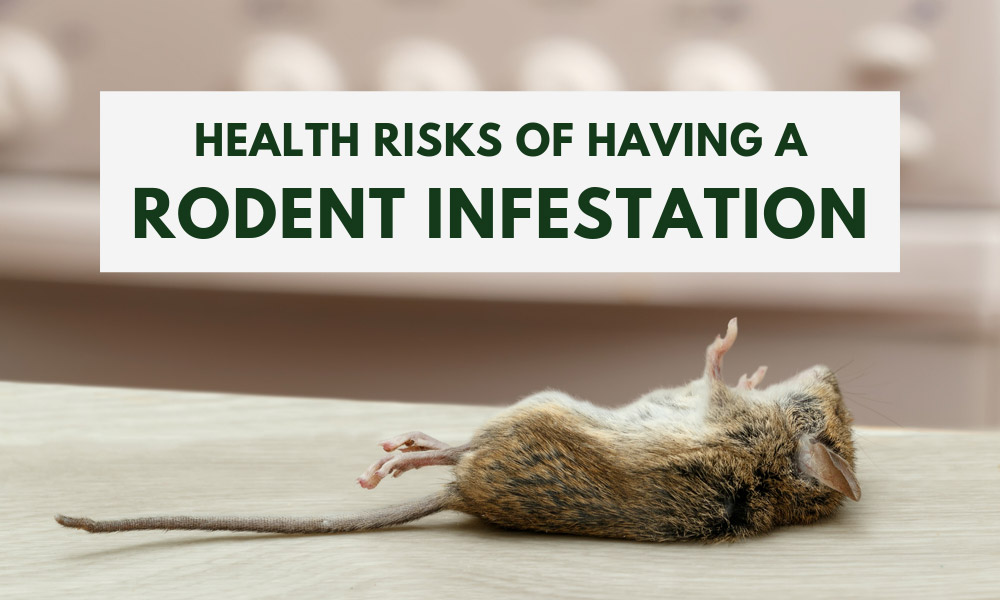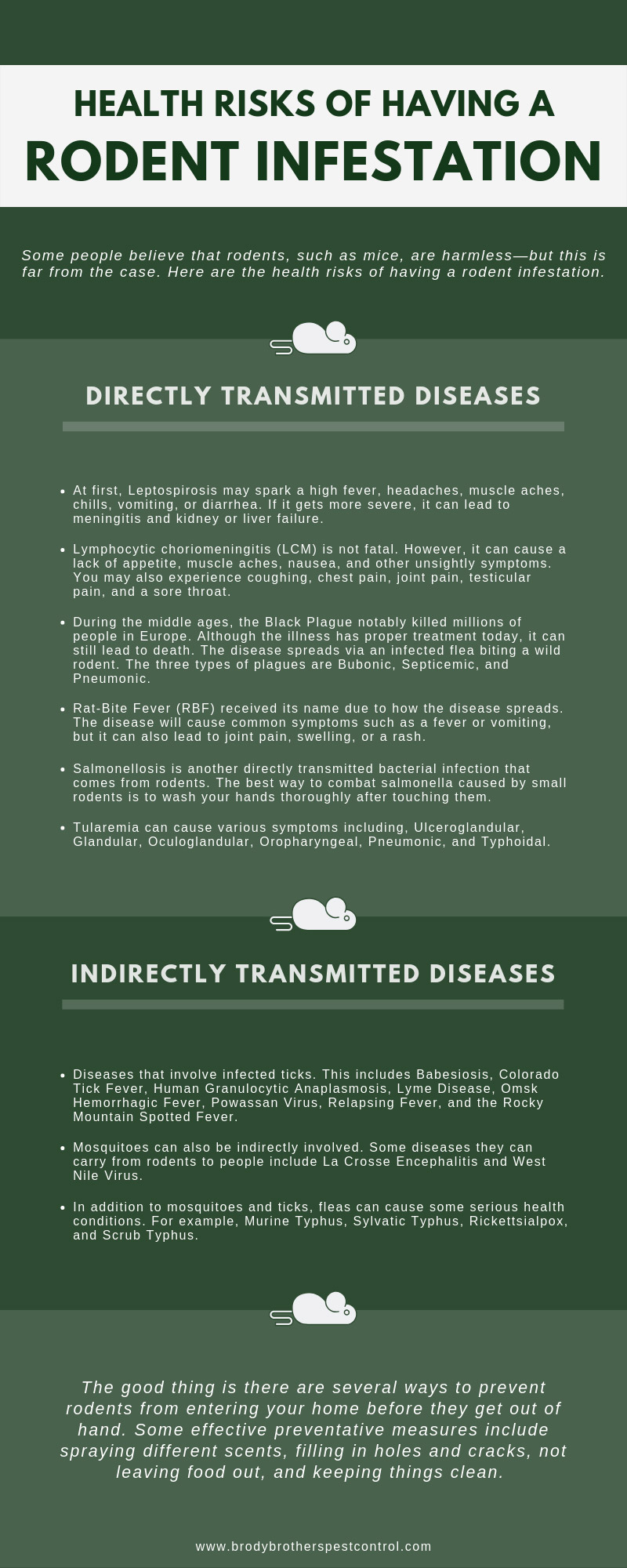
Mice—small, harmless creatures who many of us don’t worry about. However, these little critters are a health risk that will likely damage to your home. To the dismay of many homeowners, two or three mice can quickly turn into an infestation. Although this can happen at any point in the year, the fall season is a popular time for outbreaks. This is due to the temperature change, as mice go looking for shelter indoors to survive the cold.
To prevent the spread of disease and costly home repair bills, it is important to take rodent infestation seriously. These critters are a serious danger to you and your family’s health. If your home has become overrun with mice, read up on the health risks of having a rodent infestation.
Directly Transmitted Diseases
The most common way to become sick from a pest infestation is directly transmitted diseases. This includes touching or consuming anything contaminated with rodent urine or droppings. Food attracts rodents, so it can be easy to miss their small droppings in something like cereal. Rodent droppings can be as small as rice but maintain a black color. As such, you must seal your food, or you will run the risk of harming your health.
A disease may also spread directly if you come into contact with the rodent (a bite or scratch), a carcass, or another person who contracted an illness. Some can be very serious if left untreated, which is why you need to remain informed on the possible symptoms. The following are rodent diseases that can spread directly:
- At first, Leptospirosis may spark a high fever, headaches, muscle aches, chills, vomiting, or diarrhea. If it gets more severe, it can lead to meningitis and kidney or liver failure.
- Lymphocytic choriomeningitis (LCM) is not fatal. However, it can cause a lack of appetite, muscle aches, nausea, and other unsightly symptoms. You may also experience coughing, chest pain, joint pain, testicular pain, and a sore throat.
- During the middle ages, the Black Plague notably killed millions of people in Europe. Although the illness has proper treatment today, it can still lead to death. The disease spreads via an infected flea biting a wild rodent. The three types of plagues are Bubonic, Septicemic, and Pneumonic.
- Rat-Bite Fever (RBF) received its name due to how the disease spreads. The disease will cause common symptoms such as a fever or vomiting, but it can also lead to joint pain, swelling, or a rash. There are two types of RBF to be aware of—streptobacillary and spirillary. Streptobacillary RBF can cause infections in the liver, lungs, brain, and heart. A fever, swelling, swollen lymph nodes, and a rash will come from a spirillary RBF.
- Salmonellosis is another directly transmitted bacterial infection that comes from rodents. The best way to combat salmonella caused by small rodents is to wash your hands thoroughly after touching them.
- Tularemia can cause various symptoms including, Ulceroglandular, Glandular, Oculoglandular, Oropharyngeal, Pneumonic, and Typhoidal.
There are other directly transmitted diseases that no one has reported in the United States but still happen around the world. These health risks include Hantavirus Pulmonary Syndrome, Hemorrhagic Fever with Renal Syndrome, Lassa Fever, Omsk Hemorrhagic Fever, and the South American Arenaviruses (Argentine, Bolivian, Sabiá-associated, and Venezuelan hemorrhagic fever). Note that if you ever travel to continents such as Asia, Africa, or South America, there is a possibility of contracting one of these diseases.
While some people find mice to be cute, these critters could be carrying something dangerous, making a bite or a scratch even worse. Rodents are quick and may defend themselves by biting or scratching if you come into contact with them. Do your best to avoid touching them. However, if you have to, do not touch them with your bare skin. It is best to wear protective gear, such as gloves and a face mask, whenever you have to interact with the members of a rodent infestation.
Indirectly Transmitted Diseases
There is typically less of a chance of incurring an indirectly transmitted disease from mice. Nonetheless, a rodent can become infected by a disease just like humans can. Whatever disease a rodent has can spread indirectly through the air and other means. The following are indirectly transmitted diseases to be aware of:
- Diseases that involve infected ticks. This includes Babesiosis, Colorado Tick Fever, Human Granulocytic Anaplasmosis, Lyme Disease, Omsk Hemorrhagic Fever, Powassan Virus, Relapsing Fever, and the Rocky Mountain Spotted Fever.
- Mosquitoes can also be indirectly involved. Some diseases they can carry from rodents to people include La Crosse Encephalitis and West Nile Virus.
- In addition to mosquitoes and ticks, fleas can cause some serious health conditions. For example, Murine Typhus, Sylvatic Typhus, Rickettsialpox, and Scrub Typhus.
A disease acquired indirectly from a rodent infestation can be difficult to diagnose because there are so many factors at play. The main thing you need to look out for is rodent urine or little droppings, as breathing these in is an easy way to catch something. Be extremely careful when cleaning up your home and constantly lookout for these signs. If you start to experience any symptoms associated with these diseases, contact a medical professional as soon as possible. Make sure you mention to them that there are rodents in your home to prevent a misdiagnosis.
The good thing is there are several ways to prevent rodents from entering your home before they get out of hand. Some effective preventative measures include:
- Spraying different scents (mothballs, ammonia, chili powder, peppermint oil)
- Filling in holes and cracks
- Not leaving food out
- Keeping things clean
- Investing in a closed garbage can
If it is too late and you start to notice mice around your home, you will need to attack the situation differently. An infestation can be nearly impossible if you try and stop on your own. This is why you should enlist the services of a professional. Brody Brothers offers the best pest control in Baltimore, MD, who can handle the issue.


